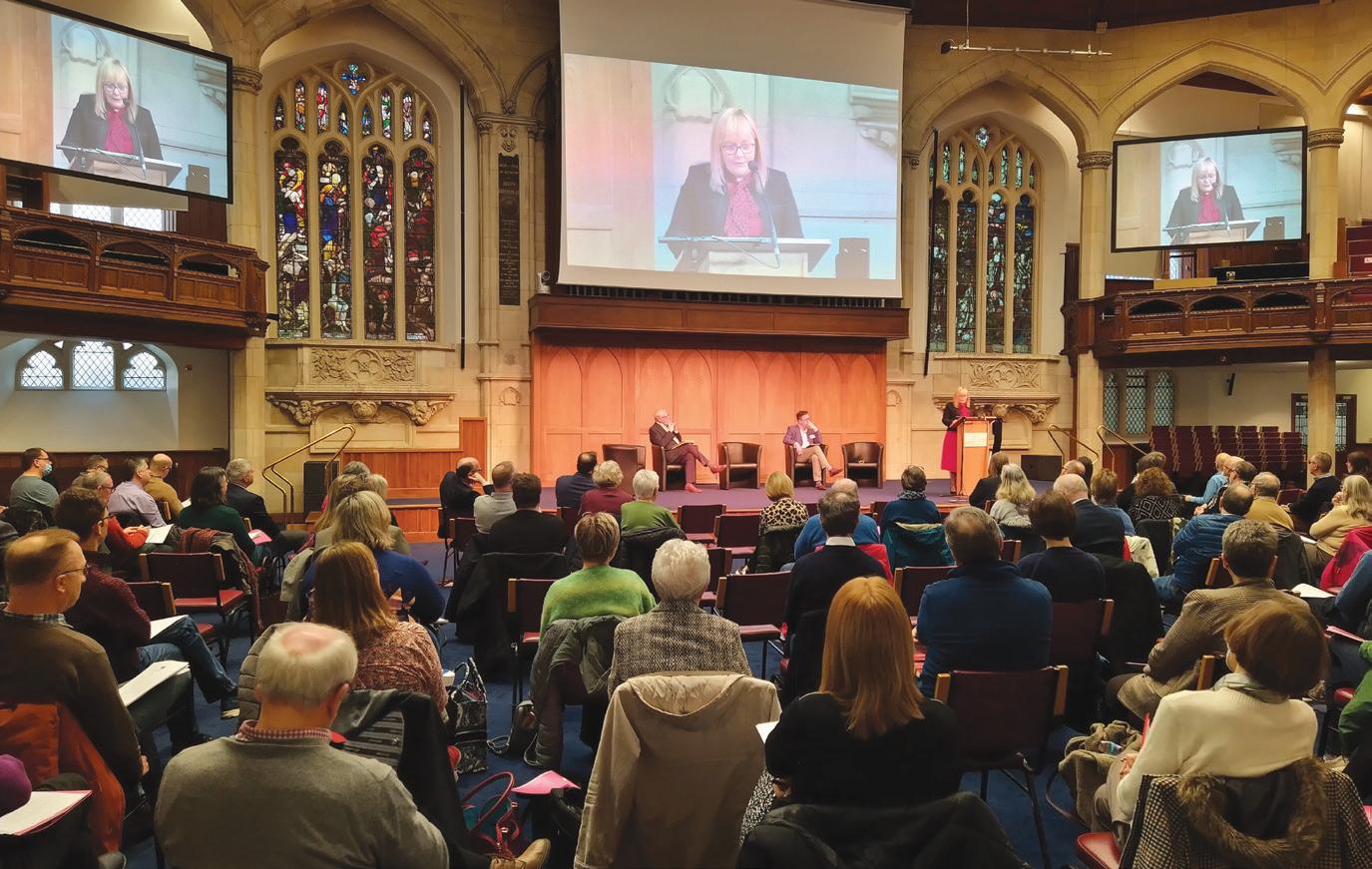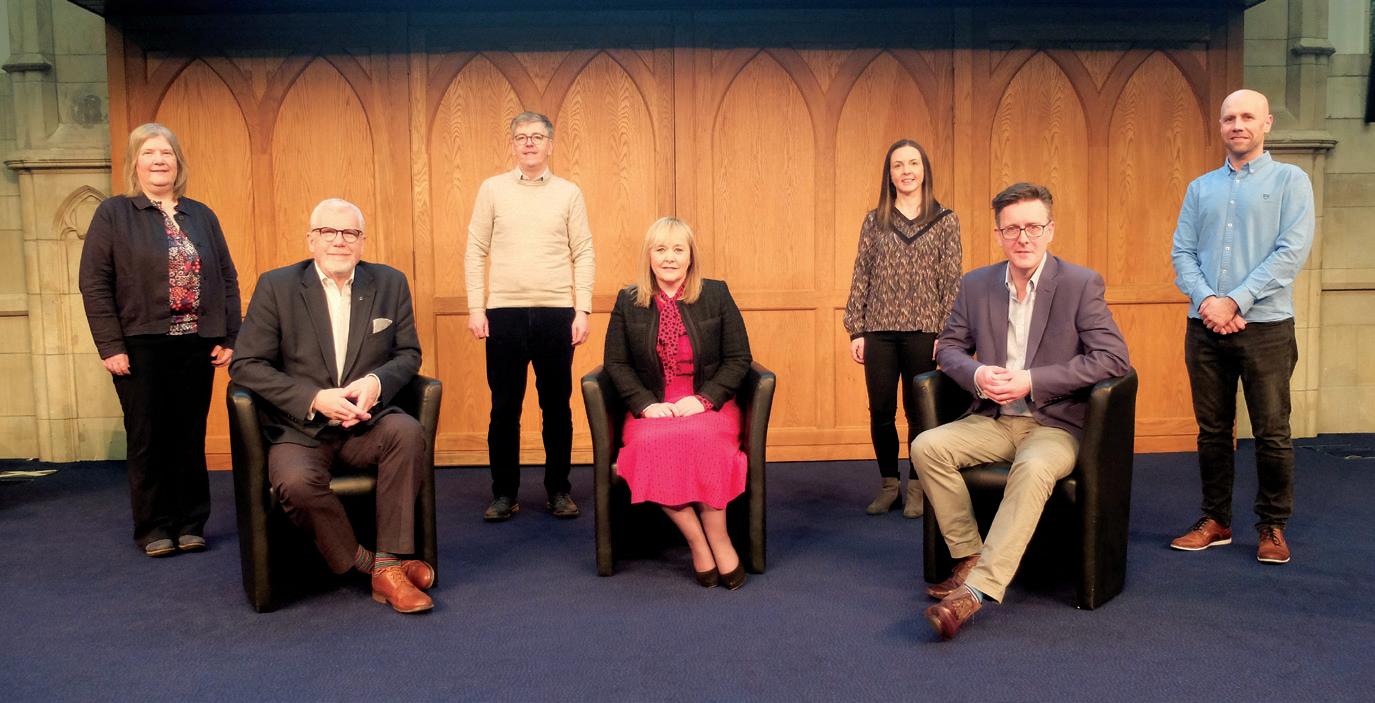
10 minute read
A time to talk…and a time to act
A time to talk… & a time to act
Andy Brown reports on the ‘PCI Talks Education’ conference.
On a windswept Saturday morning at the end of January, 120 delegates and guests braved the weather and the opening up of Covid restrictions to attend ‘PCI Talks Education: A vision for the future in Northern Ireland’. The conference was attended by Presbyterians with an interest and experience in education, ranging from those beginning their teaching career to those who have retired; from teachers to principals to governors to those working in strategic, administrative and policy shaping roles within education. Also present were PCI ministers, along with partners and stakeholders from the teaching colleges, unions, sectoral support bodies and the world of politics.
It is right for Presbyterians to consider our role in education, thinking about what we do, why we do it and how we do it – and perhaps how we do it better. This desire to constantly re-evaluate, along with the current Independent Review of Education, makes now a perfect time to do this. We as a Church need to reaffirm our place within the educational system – supporting and participating in education has been part of the DNA of the Presbyterian Church in Ireland for over a century. Our Church’s history in education is undeniable and enviable, having formed schools in our quest for social justice and a desire to make education accessible. Then as now, it is also our desire for children and young people to flourish, reaching their full potential in a nurturing and holistic way.
The conference was opened by the Education Minister, Michelle McIlveen MLA. Commending the role of PCI and the impact our work has on the world of education, she reminded attendees that, “The education of our children and young people goes far beyond the Department of Education, or even schools and colleges. It requires the dedication of teachers, governors, parents and many more. The support of local churches, such as yours, is also key in placing schools at the heart of their communities.”

The keynote address was delivered via a pre-recorded video by Dr Irvin Scott, director of the Leadership Institute for Faith in Education at Harvard University’s Graduate School of Education. Dr Scott spoke of how, in a context very different from ours, the potential for tapping into the skills, resources and willingness of faith communities was having a tremendous effect on the lives of schools and communities in the United States. Reminding delegates that, in every community, there are the two constants of the local school and the local church, he cited how real partnership makes a real difference. Outlining his research, those attending were very much taken by his three-tiered model of engagement, in which churches target the specific and immediate needs of individual schools; form lasting, practical and supportive partnerships with schools; and work at the macro level to reduce systemic inequities. He told delegates that the key to success in reducing inequity, supporting need and raising standards is the formation of partnerships and the idea of giving freely, expecting nothing in return.
This theme became an important focus and outcome of the day, and in a panel discussion with Dr Barbara McDade (Stranmillis University College), Rev Robert Herron (Education
Authority board member), Mark Beattie (primary school principal) and Leanne Dunlop (Scripture Union Northern Ireland) there was a clear consensus that what schools need is tangible and unconditional support from churches, beginning with real relationships through which specific needs are ascertained and responded to in appropriate ways.
Reflections and responses
In group discussion with the delegates, responses were wide-ranging, yet affirmed the importance of our work and the investment made over generations to individual schools and the system as a whole. The pursuit of social justice was paramount in what we do, as was the desire for children and young people to achieve their full potential. Delegates believed that our system has many positives in that it is open to all; facilitates parental choice; is closely linked to the local community; and supported by skilled, committed and dedicated educationalists, voluntary governors, parents and local churches. There was a clear acknowledgement, however, that it is an under-funded, underresourced, results-driven system beset by duplication and competition, in which a disproportionate focus on academic achievement has led to continued educational underachievement in areas of socio-economic disadvantage.
There was a sense that our work could benefit from more time and training given to ministers and governors, with education having a higher profile at presbytery and congregational levels. The relentless pressure on school leaders was a recurring theme, with clear calls for local churches to be a support in this area, through sustained partnership and the building of tangible relationships. Whilst schools greatly appreciate our work at the strategic level, whether at the top of the system or on an individual board of governors, and our input with assemblies and RE, there are huge practical needs in schools which can only be dealt with by rolling up our sleeves.
Delegates agreed that our values are intrinsic to a wholesome education system, but that these same values can be claimed by others. Where we differ is in the consistency and nonconfrontational way in which we live these out, but there was a need to ensure that we articulate these clearly to a secular society in a language that it understands. Acknowledging the changing face and attitudes of that society, along with its increasing diversity, there was an understanding that how we deliver our messages has to be done in a contemporary, relevant manner which is cognisant, respectful and reflective of the different life experiences of children and young people.
There was much debate over the purpose of education in Northern Ireland and what is valued within our system. Real concerns were expressed over the pathways that children have to take and how this affects their sense of worth and esteem along with the future direction of their lives. There was a clear call for flexible assessment, which recognises the range of abilities and skills, and which celebrates these. The current, high-stakes
system appears blunt and flawed and, whilst it suits some, it certainly does not suit all, leading to inequities and disparities which are hard to justify. Delegates concluded their discussions with a clarion call for a system which is more equal, meeting the needs of all abilities, aptitudes, social classes and backgrounds, and more equitable, recognising, funding and resourcing fitfor-purpose schools on a par with each other.
Independent Review of Education
Our deliberations at the end of January have informed an initial response to the Independent Review of Education, which is currently considering every aspect of the school system in Northern Ireland, including governance arrangements and sectoral organisation. Specifically, it has been asked to consider what a ‘single education system’ might look like in this jurisdiction.
A key part of PCI’s response focuses on the importance of ethos. Drawing on an article from Dr Olywn Mark, lecturer of Practical Theology at Union Theological College, we have reminded the review panel that there is no such thing as ‘morally neutral’ education. Nondenominational Christian values and principles continue to have a significant role in shaping and grounding the education system here. Just as there is an increasing focus within our schools on mental and physical health, so too it is important that the spiritual wellbeing of children and young people is not neglected within the school environment. There should be room for each of these within the parameters of a holistic education system.
As for a ‘single education system’, PCI has reminded the panel that across these islands, from Ireland to England, from Scotland to Wales, there is no single education delivery mechanism but rather a multiplicity of arrangements. One of the benefits of our current ‘dispersed’ system is that it provides for many different people from a variety of walks of life, engaging with them and supporting them in school communities. Significantly the current arrangements in Northern Ireland facilitate and provide for parental choice. Should the opportunity for parents to choose the ethos within which they wish their children to be educated be removed, there is a risk that new, informal sectors might be formed in response.
PCI’s submission to the panel concludes like this: “There is a wellknown saying, often associated with African cultures, that ‘it takes a village to raise a child’. Never is this more true than in the context of educating our children and young people, enabling them to reach their full potential, and preparing them to be responsible and conscientious citizens. PCI remains ready to play its part in supporting schools, educators and pupils for years to come, just as it has until now.”

What happens next?
In case there is any doubt, please do not assume that PCI is happy to only ‘talk’ about education and leave it there. The work of PCI at a denominational, presbytery and congregational level continues to be extremely important. We believe that the values and Christian ethos that PCI, and the other Churches, cherish and promote in education are healthy and positive for children and young people. At the same time, our partnerships with local schools in our communities are an act of service for the common good. The conference was an important opportunity to reflect on how, in a changing world, we can continue to be effective in our mission to serve our society, our communities, our families, our children and young people, through constructive leadership and partnership in education. In the context of this changing educational landscape, it was a vital moment for us to pause and consider what that involvement might look like for the next 100 years.
In the weeks following the event there have already been examples of partnerships being formed or galvanised, conversations taking place and needs being addressed. And it is our hope and prayer that God will continue to bless the work being done across this island within the field of education, that he will encourage and strengthen us as we continue to give in this sphere, and that society will see anew the importance of our unconditional service.
In Northern Ireland, as we move forward into the second century of our involvement, we pray that it will be one in which we continue to freely and positively impact the lives of pupils, school staff, parents, communities and society, and that they will see in us partners in the vital work of nurturing and realising the full potential of every child and young person.
Dr Andy Brown is a principal lecturer in Education and convener of PCI’s State Education committee.


